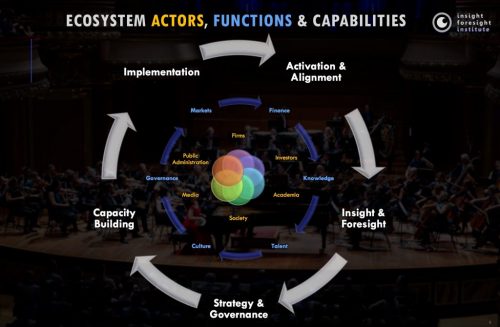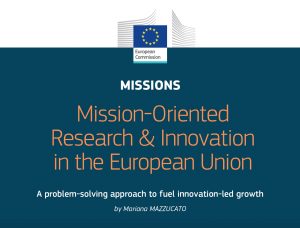The CEO of IFI, Totti Könnölä advises the Joint Research Centre of the European Commission in its work to support the Andalusian Government to create industrial transition towards carbon neutrality. Within the frame of the project RIS3 Support to Lagging Regions, the JRC has launched a Working Group on Understanding and Managing Industrial Transitions.

The Working Group aims to support regional (and where appropriate national) authorities facing major industrial transitions, away from declining sectors and activities and charting actionable paths towards employment-intensive economic growth. The Working Group comprises of JRC staff, an Advisory Board and external experts engaged in reviews of industrial transition, coordinated by Ken Guy (Advisory Board Member of IFI).
The core activity of the Working Group are the reviews of industrial transition following a common methodology (POINT, Projecting Opportunities for INdustrial Transition) that draws on expertise on system innovation/transition management, foresight, industrial policy and innovation governance.
The reviews focus on an industrial theme of growing global importance suggested by the relevant territorial authorities (for instance, but not confined to: climate change, electrification of transport, circular economy, digitalisation, artificial intelligence) to collect evidence and examine the scope for developing adequate territorial responses that harness cross-portfolio complementarities (e.g. between ministries and between levels of governance) and cross-stakeholder coordination (e.g. between businesses and broad constituencies of consumers/users). In each territory under review and for an industrial theme suggested by the authorities the final report will:
(a) Map the affected orientation, resource mobilisation, production and consumption systems in the territory;
(b) Document existing planning arrangements and directions of deliberate change (e.g. as described in thematic policy and business strategies, or evident in momentum-gathering social concerns and movements, consumer trends, common territorial values etc.) of various stakeholders in the affected systems that could later form the basis for a broadly-supported transition vision;
(c) Make concrete suggestions for the advancement of the transition and for managing its downsides. Given the nature and magnitude of the transition challenge, adequate territorial responses will include not just research and innovation policies that are already part of RIS3, but also industrial and employment policies more generally, including provisions for education and skills, for complementary large public infrastructures (e.g. in energy, transport, waste), urban planning, fiscal policy and social security reform, among others. Therefore the recommendations of the review will place a particular emphasis on fostering alignment and coordination within government.
The reviews aim to build the evidence base for appropriate “Actions to Manage Industrial Transitions”, as stipulated in fulfilment criterion No.6 of the enabling condition of good governance foreseen in the next multi-annual financing period of the EU Structural Funds (without prejudice to the final decision of the European Commission). The reviews can further inform RIS3 design and implementation (e.g. refining or extending priorities, broadening the EDP, fostering synergies with other funding streams) as well as informing, and been informed by, industrial policies and other territorial strategies for economic and social development. More broadly, it is hoped that the reviews can be an input to a participatory process of stakeholder engagement leading to the development of credible positive visions for the future that can be the source of pride and inspiration for the region (or country) and a rallying point for the mobilisation of actors and resources from all levels.
The JRC plans to complete three such reviews (Andalucía, Bulgaria and Greece) in the current phase of the project in 2020.
For more information
Working Group on Understanding and Managing Industrial Transitions


 As a response to the Commission public consultation on the report of Professor Mariana Mazzucato on ‘
As a response to the Commission public consultation on the report of Professor Mariana Mazzucato on ‘ Juan Mulet Melia, a member of the Innovation Council of IFI, and Totti Könnölä, CEO of the Insight Foresight Institute (IFI), write in Cinco Días, one of the leading economic journals in Spain, to promote smart specialization in the regions.
Juan Mulet Melia, a member of the Innovation Council of IFI, and Totti Könnölä, CEO of the Insight Foresight Institute (IFI), write in Cinco Días, one of the leading economic journals in Spain, to promote smart specialization in the regions.